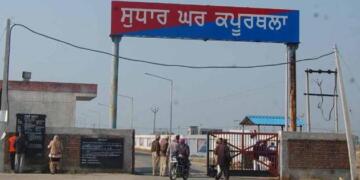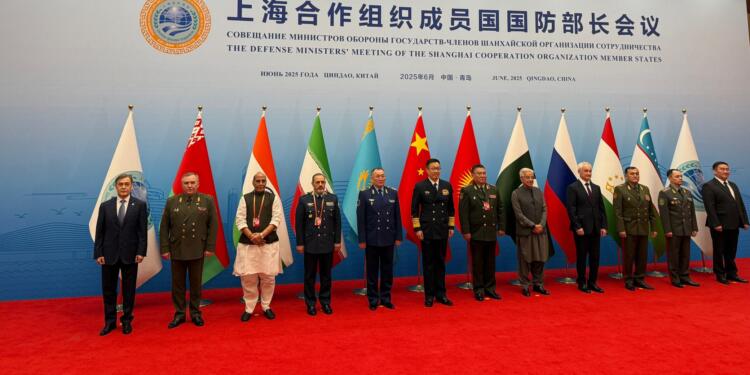In a grand conference hall overlooking the Yellow Sea, the 2025 Shanghai Cooperation Organisation (SCO) Defence Ministers’ Meeting was intended to reaffirm collective strength and strategic cohesion. Instead, it became a stark demonstration of disunity. India’s Defence Minister, Rajnath Singh, refused to endorse the joint communiqué. His objection was direct and deliberate: the statement failed to acknowledge the April 22 terror attack in Pahalgam, Jammu and Kashmir, which killed 26 civilians, most of them tourists.
The omission was not a diplomatic oversight but a revealing political choice. For New Delhi, the failure to condemn a clear act of cross-border terrorism contradicted the founding principles of the SCO. Singh’s rejection of the communiqué marked a rupture both symbolic and substantive in what is often described as the world’s largest regional security organization.
From Shanghai Five to a Strategic Behemoth
The SCO, formally established in 2001, traces its origins to the “Shanghai Five” grouping formed in 1996 by China, Russia, Kazakhstan, Kyrgyzstan, and Tajikistan. Initially designed to resolve border disputes and promote regional stability, the organization expanded in ambition and scope with the inclusion of Uzbekistan and later, major powers such as India and Pakistan in 2017, Iran in 2023, and Belarus in 2024.
Today, the SCO comprises 10 full members, representing 42% of the global population, 65% of Eurasia’s landmass, and approximately 23% of global GDP by nominal terms (36% by purchasing power parity). Despite these impressive figures, internal contradictions increasingly undermine the organization’s effectiveness.
The Qingdao Summit: Discord Over Diplomacy
The 2025 summit in Qingdao was intended as a showcase of multilateral strength. Instead, it exposed strategic and ideological fault lines.
India’s refusal to sign the final communiqué was not a routine diplomatic protest. It represented a clear rebuke to the SCO’s inability or unwillingness to address terrorism in an unambiguous manner. The April 22 attack in Pahalgam, executed by The Resistance Front, a known proxy of Lashkar-e-Taiba, was conspicuously absent from the summit’s statement. In his address, Rajnath Singh did not explicitly name Pakistan, but his criticism left little ambiguity. He asserted that no regional organization could claim credibility while tacitly accommodating actors that use terrorism as an instrument of statecraft.
Singh described the SCO’s selective outrage as a betrayal of its founding values. His stance echoed India’s earlier position in Beijing, where National Security Advisor Ajit Doval declined to endorse an SCO statement criticizing Israeli strikes on Iran. These actions underscore India’s increasingly assertive diplomatic posture one that prioritizes strategic autonomy over bloc solidarity.
India-Pakistan: The Structural Faultline
The presence of both India and Pakistan within the SCO exemplifies the organization’s ambition to transcend historic rivalries. However, the events at Qingdao laid bare the limits of this vision.
Just weeks before the summit, India had launched ‘Operation Sindoor’ on May 7, 2025- a precision strike against terror infrastructure across the Line of Control, reportedly eliminating 19 militants. In stark contrast, Pakistan used the summit to push for the revival of the SCO-Afghanistan Contact Group, a move that appeared disconnected from India’s immediate security concerns.
The absence of any bilateral engagement between India and Pakistan; no handshakes, no sideline discussions was not merely symbolic. It highlighted the SCO’s inability to foster substantive dialogue between adversarial members. Unlike NATO, the SCO lacks binding commitments, shared threat assessments, or unified doctrines. It remains a platform of disparate national agendas rather than a community of strategic alignment.
China’s Role: Arbiter or Agenda Setter?
As the 2025 chair of the SCO, China projected the organization as a cornerstone of a ‘multipolar world’. However, this rhetoric often conceals divergent member-state interpretations of multipolarity.
Chinese Defence Minister Dong Jun emphasized unity, denounced ‘external interference’, and praised the ‘Shanghai Spirit’ a term evoking mutual trust and non-interference. Yet China’s expanding influence through initiatives like the Belt and Road Initiative has generated unease, particularly in India, which remains wary of any attempt to transform the SCO into a vehicle for Chinese geopolitical objectives.
Despite brief bilateral talks between Rajnath Singh and Dong Jun during the summit, no progress was reported on enduring border disputes. India’s concerns over sovereignty and strategic autonomy continue to constrain deeper alignment within the SCO.
Russia: Balancing Between Partners
Amid Western sanctions and economic isolation, Russia increasingly views the SCO as a strategic lifeline. The organization allows Moscow to maintain influence in Central Asia and engage diplomatically with key Asian powers.
At Qingdao, Russia broadly supported China’s regional messaging but refrained from endorsing Pakistan’s position against India. This nuanced stance reflects Moscow’s delicate balancing act: maintaining its strategic partnership with China while preserving ties with India, a key defence partner. However, sustaining this balance is becoming increasingly difficult as intra-bloc divisions deepen.
Beyond Geopolitics: Climate, Energy, and Connectivity
Despite its geopolitical challenges, the SCO is expanding its agenda to include non-traditional areas of cooperation. At the SCO Energy Ministers’ Meeting in Ningbo, delegates discussed hydrogen technologies, renewable integration, and regional energy grids. China released the SCO Renewable Energy Cooperation Report 2024, while member states committed to joint research and development in sustainable technologies.
The adoption of 2025 as the ‘Year of Sustainable Development’ signaled the bloc’s pivot toward climate diplomacy, with ongoing discussions on transnational water sharing and carbon market cooperation. In these areas, less encumbered by political sensitivities functional consensus remains achievable.
Tangible Achievements: Often Overshadowed
While criticism of the SCO is frequent and often valid, the organization has recorded notable achievements:
Counterterrorism: Through the Regional Anti-Terrorist Structure (RATS) in Tashkent, the SCO claims to have prevented over 600 planned attacks and dismantled numerous terrorist training camps.
Border Dispute Resolution: Early successes in resolving China-Central Asia border issues established a platform of trust among member states.
Infrastructure and Connectivity: The Central Asia–China Gas Pipeline and the International North-South Transport Corridor (INSTC) illustrate the bloc’s capacity to drive regional infrastructure development.
Cultural and Soft Power Initiatives: Cultural diplomacy, exemplified by the SCO Arts Festival and India’s leadership of the SCO Startup Forum, continues to promote people-to-people linkages.
Structural Limitations: Four Enduring Weaknesses
Despite these accomplishments, the SCO is constrained by several structural flaws:
Consensus-Based Decision Making: The requirement for unanimity often results in diluted or stalled outcomes, especially on contentious issues such as terrorism or sovereignty.
Enduring Bilateral Hostilities: Historical grievances, particularly between India and Pakistan or India and China, frequently hijack multilateral agendas.
Power Asymmetry: China and Russia dominate the bloc, while smaller states often find themselves marginalised in decision-making processes.
Lack of Legal Enforcement: The absence of binding mechanisms renders the SCO largely declarative, with limited ability to enforce compliance or cooperation.
The SCO in 2025: Enduring but Insufficient
The SCO represents an ambitious vision: a transcontinental platform that connects diverse political systems, ethnic groups, and strategic cultures. Its very existence underscores the necessity of dialogue in a fragmented international order.
Yet, the organization’s relevance increasingly lies not in the communiqués it produces, but in the tensions it reveals. India’s principled stand at Qingdao was not merely obstructionist; it reflected a growing demand for honesty, accountability, and security-driven multilateralism. The SCO must confront its contradictions or risk retreating into diplomatic inertia.
Ultimately, the SCO’s future will not be determined within summit halls but in the complex spaces between them; where national interests collide, security is tested, and diplomacy is redefined for a changing world.























